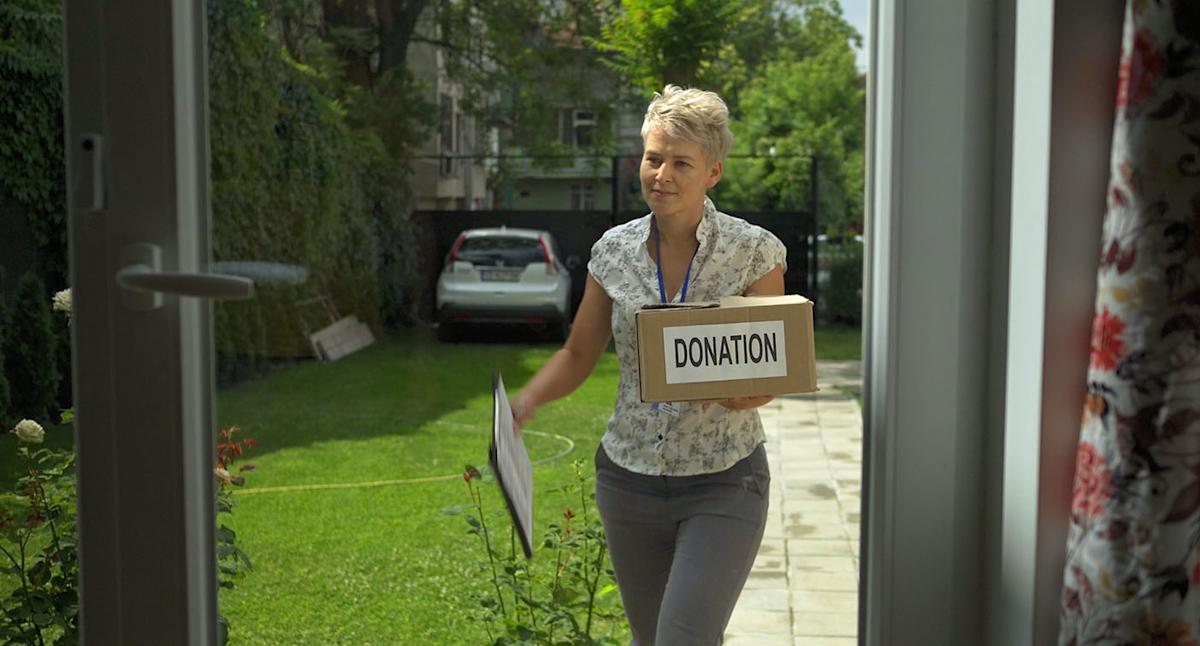Charity workers going door-to-door can be off putting for some residents wanting privacy. · Getty
Welcome to Yahoo Finance’s legal column where lawyers Alison and Jillian Barrett from Maurice Blackburn tackle problems everyday Aussies face — whether it be consumer, property, money matters impacting relationships or work. This week, a homeowner has had it with charity door-knockers.
Question
I have reached breaking point with a neighbourhood issue and want to know if there’s any legal way to stop it happening. There are people coming to knock on my door multiple times a week to effectively beg for money. They are charity workers – legitimate ones – but I am sick of the guilt trip that gets put on me and feel like it’s an invasion of my privacy as a homeowner. It used to be here and there but now my neighbourhood is getting targeted constantly. I know people will say don’t open the door but they come up and ring the door bell, which not only annoys me it wakes up my newborn. I’ve also got pretty open windows so they can see into the lounge room and know I am there. It just makes me uncomfortable. I donate to charities of my choosing and these are the same ones coming back over and over. It’s like those enraging texts we are bombarded with. I don’t feel like putting up a sign would help and there isn’t a do not call register for this. I know people can’t approach you when you are withdrawing cash at ATMs, surely there is some kind of rule. Calling each individual charity as they come seems excessive. I just don’t want any part of it and wonder if there’s anything I can do.
Answer
You’re not alone in feeling frustrated with constant requests for donations while in the privacy of your own home.
Charities are exempt from the consumer laws and penalties for breaches that apply to telemarketing and door-to-door sales.
Further, as you have foreshadowed, there is no national ‘do not contact’ register that applies to charities.
That said, there are steps you can take to regain your peace and privacy.
Placing a “No Door Knockers” sign on your property can serve as a legal notice to not enter.
You could even make it more bespoke with something like “no charity collectors” and ‘trespassing will be reported”.
While it may not deter everyone, it strengthens your position if you need to escalate the issue.
Do you have a matter you want resolved? Contact yahoo.finance.au@yahooinc.com
If you’ve erected a sign stating you do not permit door knockers, this act could be considered trespassing. · Getty
If the same charities continue to disturb you despite the sign and your requests to not visit, this could be considered trespass, particularly because it is causing you distress and disruption.
In this situation, keep a record of dates, times and the charity organisation and consider contacting your local police to discuss whether it constitutes trespass.
Story Continues
You should contact the charity directly by using the details on its website or on the ACNC Charity Register.
Sometimes charities use external fundraising agencies to manage their fundraisers and the people door knocking may not be employed by the charity directly.
The charity may therefore be unaware of the disruption and be eager to take remedial action, particularly if it is a poor representation of their brand.
When you contact the charity you should ask to have your details added to their “do not visit” list.
Most organisations maintain these kinds of lists.
Charities must comply with any relevant fundraising laws that are in operation in the state or territory they are operating in.
Most states have laws that ensure the charity collectors are registered and can only visit between the hours of 9am and 5pm.
They are required to leave immediately if asked and not intimidate, annoy or shame you into donating.
Alison and Jillian Barrett are Principal Lawyers at Australia’s leading plaintiff law firm, Maurice Blackburn. · William Gordon Photography
Each state has their own consumer protection regulator who will investigate complaints, for example, NSW Fair Trading, Queensland’s Office of Fair Trading and Consumer Affairs Victoria.
You could contact them for advice or to make a complaint.
The ACNC is the national regulator and registration body for charities.
It has investigation powers and will be particularly concerned where it is alleged that a charity has not met its obligations or is engaging in conduct that is harmful.
The charity may be a member of the Fundraising Institute of Australia.
If so, they also have the right to investigate complaints about its members.
Ultimately, you have the right to feel safe and undisturbed in your own home.
This legal information is general in nature and should not be regarded as specific legal advice. If you need legal advice, you should consult a solicitor.

